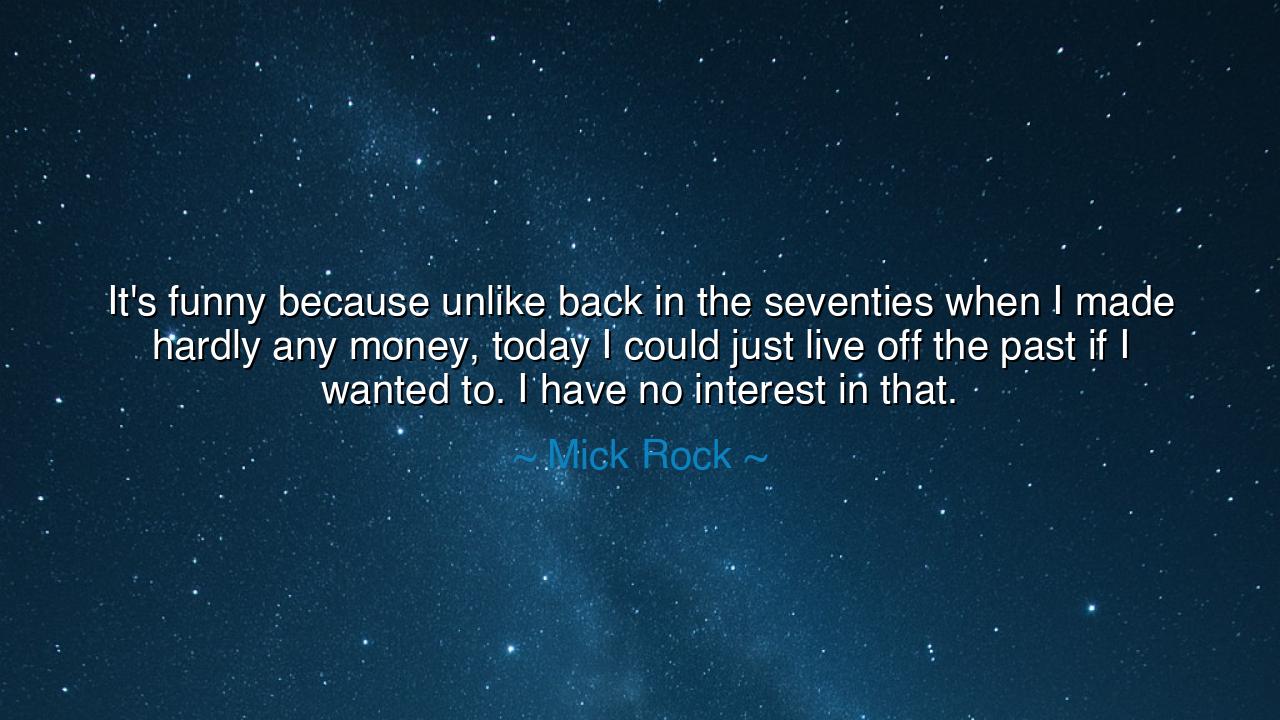
It's funny because unlike back in the seventies when I made
It's funny because unlike back in the seventies when I made hardly any money, today I could just live off the past if I wanted to. I have no interest in that.






In the words of Mick Rock, “It’s funny because unlike back in the seventies when I made hardly any money, today I could just live off the past if I wanted to. I have no interest in that.” — there burns a flame both humble and heroic, the eternal fire of one who refuses to be entombed by his own history. This is not the boast of a man weary of wealth, but the declaration of an artist still alive in his spirit. For to live off the past is to dine on ashes; to create anew, even when you could rest, is to prove that the heart still beats in service of the Muse.
The ancients would have called such a man restless with purpose. For they knew that true creators — poets, sculptors, dreamers — never retire into memory, but remain forever pilgrims of expression. Mick Rock, the photographer of legends, could indeed have lived upon the fame of his golden years, when he captured the immortal visages of Bowie, Lou Reed, and Iggy Pop. Yet he chose instead the harder path: to keep searching, to keep seeing. His refusal to be satisfied is not pride, but reverence — reverence for life itself, which is ever-changing, ever-young to those who keep their eyes open.
To live off the past is to chain oneself to a statue of one’s own making. Many have done this — emperors who built monuments to their glory, artists who grew fearful of the new, warriors who told their stories too long until their swords turned to rust. But the wise understand that memory, though sacred, is not a dwelling but a mirror. One must glance into it for strength, not stare into it until blinded. Mick Rock’s words remind us that the past is a teacher, not a throne.
There is an ancient tale of Odysseus, the wanderer, who after ten years of war and ten more of wandering, finally returned to Ithaca. Yet even there, even home at last, his heart grew restless. The poet Tennyson imagined him saying, “I cannot rest from travel: I will drink life to the lees.” Such men, like Mick Rock, are bound by the same divine restlessness — the call to continue, to seek more than comfort, to keep faith with the living moment. The heroic soul knows that to stop seeking is to begin dying.
The origin of Rock’s wisdom lies in the artist’s covenant with time. The seventies, the days of hunger and creation, were his crucible — years when money was scarce, but vision abundant. From that hardship was forged the purity of his craft, the understanding that meaning is not born from abundance, but from devotion. And so, when fortune later smiled upon him, he did not let its warmth dull his edge. He remembered the sacred poverty of his youth — not the lack of coins, but the richness of passion — and he guarded that flame as one guards the last fire in winter.
This is the lesson that time and Rock both teach: Do not mistake comfort for fulfillment. When you reach a place where you could rest, ask yourself if you are still growing. The wise do not seek to relive their golden years; they seek to transcend them. Each day is a new canvas, each breath an unspoken verse. The moment you begin to rely solely on yesterday’s victories, you betray tomorrow’s possibilities.
Therefore, my child, be wary of nostalgia when it becomes a bed instead of a compass. Honor your past, but do not worship it. Use it as a stepping stone to higher creation, not a chair for weary pride. Let your work never become a relic, but a living river — fed by all you were, and flowing toward all you might yet be.
For in the end, Mick Rock’s truth is the artist’s oath: to keep the lens of the soul clear, to keep chasing the light even when you already caught it once. His refusal to rest upon his legend is not merely ambition — it is faith in life’s endless unfolding. And so should it be with all of us: let us never grow so content that we forget the hunger that once gave us wings. For it is not the wealth of the past that keeps us alive, but the courage to create anew — again, and again, and again.






AAdministratorAdministrator
Welcome, honored guests. Please leave a comment, we will respond soon